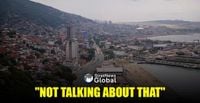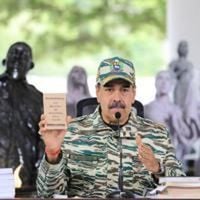In a week marked by rising tensions in the Caribbean, the United States and Venezuela have edged closer to a dangerous standoff, with military maneuvers and sharp rhetoric fueling fears of escalation. The latest developments come after a series of provocative incidents, including Venezuelan fighter jets buzzing a US Navy destroyer and the Trump administration’s deployment of advanced stealth fighters to the region.
On September 5, 2025, President Donald Trump addressed reporters to clarify the US position regarding Venezuela, stating, “We’re not talking about that, but we are talking about the fact that you had an election which was a very strange election, to put it mildly.” According to Reuters, Trump was referring to the contested 2024 Venezuelan election, which President Nicolas Maduro claims to have won—an outcome the US has repeatedly questioned.
Despite the military buildup and increasingly bellicose exchanges, Trump insisted that Washington is not pursuing regime change in Caracas. However, the deployment of 10 additional F-35 stealth fighter jets to Puerto Rico, as reported by multiple outlets including CNN and Reuters, has sent a different signal to observers in the region. The jets are intended for operations against drug cartels, but their presence has raised the stakes in an already volatile environment.
The immediate trigger for the latest round of tensions was a highly charged incident on September 4, when two Venezuelan F-16 jets flew near the US Navy destroyer USS Jason Dunham in international waters. The Pentagon described the maneuver as “a highly provocative move.” Trump, in response, warned, “If they do put us in a dangerous position, they’ll be shot down.” He emphasized that US commanders on the scene would have the authority to make that call, saying, “If they fly in a dangerous position, I would say that… you or your captains can make the decision as to what they want to do.”
This wasn’t the first time Venezuelan aircraft had approached US naval vessels in the area. According to The US Sun, the September 4 flyover marked the second such incident involving the USS Jason Dunham. US officials have characterized these confrontations as a “game of chicken,” with both sides testing the other’s resolve.
The US military presence in the southern Caribbean has grown considerably in recent months. In addition to the newly deployed F-35s, Washington has stationed at least eight naval destroyers and more than 4,000 soldiers and Marines in the region. US Marines from the 22nd Marine Expeditionary Unit have been conducting amphibious training and flight operations in southern Puerto Rico, further reinforcing America’s strategic posture.
President Trump has justified these moves as part of an intensified campaign against Latin American drug cartels, which he accuses Venezuelan President Maduro of supporting. On September 2, the US military struck and sank a Venezuelan boat that Trump said was transporting illegal narcotics and linked to the notorious Tren de Aragua gang. The attack killed 11 people and marked a significant escalation in the so-called “war on drugs.”
“There was massive amounts of drugs coming into our country to kill a lot of people, and everybody fully understands that. Obviously, they won’t be doing it again. And I think a lot of other people won’t be doing it again,” Trump declared after the strike, as quoted by The US Sun. He added, “There’s more where that came from.”
The Trump administration has designated multiple gangs, including Tren de Aragua, as terrorist organizations, a move that officials say gives them the legitimacy to conduct military strikes against suspected traffickers. Defense Secretary Pete Hegseth underscored the seriousness of the mission, stating, “We’ve got assets in the air, assets in the water, assets on ships. Because this is a deadly serious mission for us, and it won’t, it won’t stop with just this strike.”
Venezuelan President Maduro, for his part, has vehemently denied the US accusations. He has called for peace and dialogue, urging Washington to “abandon its plan of violent regime change in Venezuela and in all of Latin America and respect sovereignty, the right to peace, to independence.” On state television, Maduro said, “I respect Trump. None of the differences we’ve had can lead to a military conflict. Venezuela has always been willing to converse, to dialogue.”
Still, Maduro has responded to what he calls “maximum military pressure” by ordering the mass mobilization of more than four million troops. He maintains that his government dismantled the Tren de Aragua gang in 2023 following a prison raid, and he has dismissed US claims of ongoing cartel activity as unfounded.
The US approach has not been without domestic criticism. Representative Ilhan Omar of Minnesota condemned what she described as “lawless” actions in the Caribbean, arguing that “Congress has not declared war on Venezuela, or Tren de Aragua, and the mere designation of a group as a terrorist organization does not give any President carte blanche to ignore Congress’s clear Constitutional authority on matters of war and peace.” Legal experts, too, have questioned the justification for the recent military strike, suggesting that suspects should have been arrested rather than killed.
Despite Trump’s repeated assertions that the US is not seeking regime change, the scale and scope of the military buildup have fueled suspicions in Caracas and beyond. According to CNN, White House officials are considering further strikes against suspected cartel targets inside Venezuela, a move that would represent a dramatic escalation and risk direct confrontation with Maduro’s forces.
The White House, Pentagon, and State Department have not publicly detailed the legal rationale for the September 2 strike or provided evidence linking the boat’s crew to Tren de Aragua. Venezuela’s Communications Ministry has not responded to requests for comment regarding the F-35 deployments or the allegations of provocative flyovers.
As the situation unfolds, both sides appear locked in a cycle of action and reaction. The US has seized $700 million in assets allegedly linked to Maduro since August, including luxury goods and private jets. Meanwhile, the Venezuelan government continues to denounce what it sees as American aggression and interference in its internal affairs.
For now, the world watches as the Caribbean becomes the stage for a high-stakes standoff. Whether the next move will come in the form of dialogue or further escalation remains uncertain, but the risks of miscalculation have rarely been higher.


